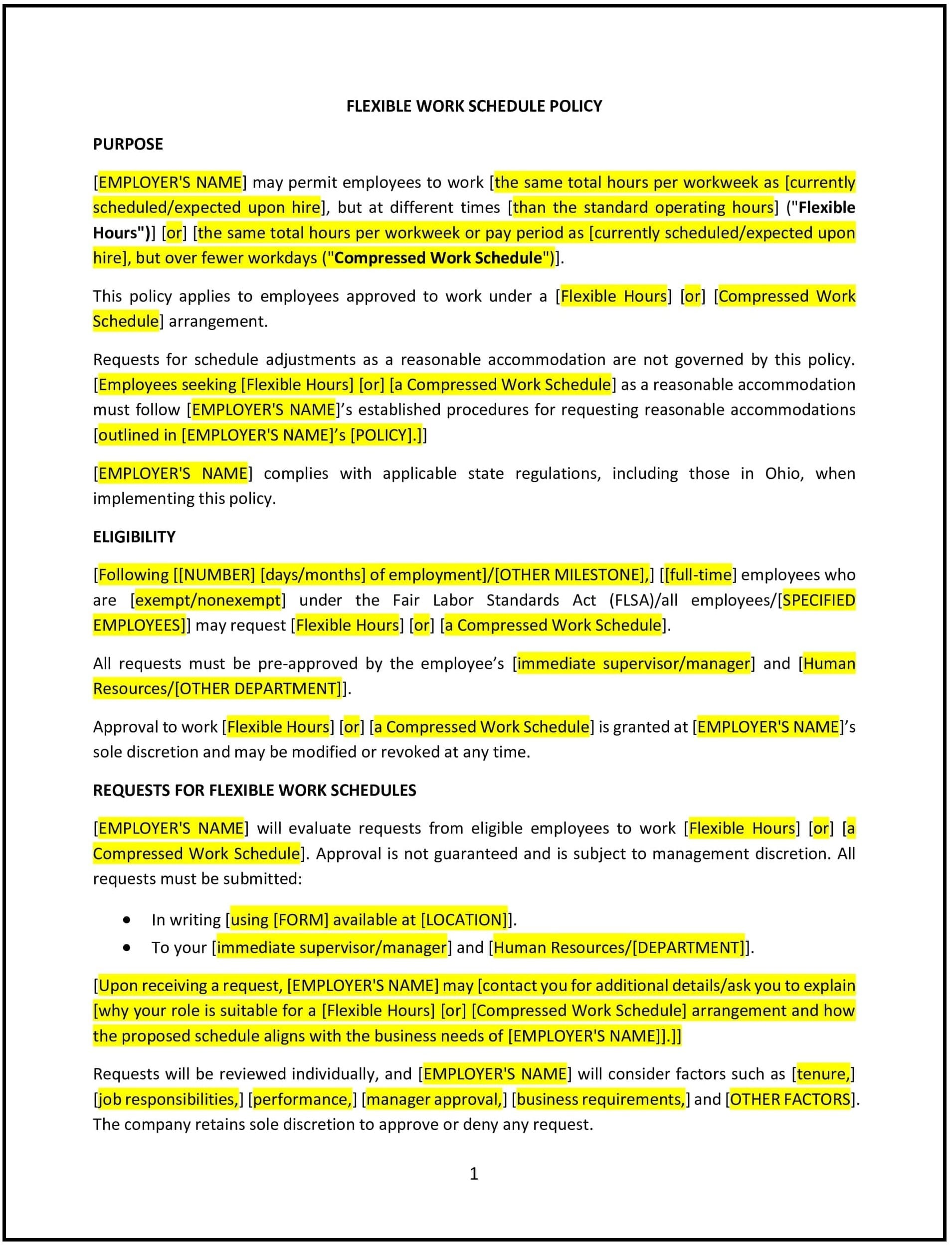Flexible work schedule policy (Ohio): Free template
Got contracts to review? While you're here for policies, let Cobrief make contract review effortless—start your free review now.

Customize this template for free
Flexible work schedule policy (Ohio)
A flexible work schedule policy provides Ohio businesses with guidelines for offering employees more control over their work hours and location, while still ensuring that business operations are maintained. This policy outlines the types of flexible work arrangements available, including adjusted work hours, telecommuting, compressed work weeks, or job sharing. It also specifies the criteria for eligibility, the process for requesting flexible work arrangements, and the expectations for employees and managers in managing flexible schedules.
By implementing this policy, Ohio businesses can improve employee satisfaction, enhance work-life balance, and increase retention, while maintaining productivity and meeting operational needs.
How to use this flexible work schedule policy (Ohio)
- Define flexible work options: The policy should clearly specify the types of flexible work schedules available, such as adjusted start and end times, telecommuting, compressed workweeks (e.g., four 10-hour days), or job-sharing arrangements. It should also clarify the business’s flexibility in offering these options, considering operational needs and business goals.
- Outline eligibility criteria: The policy should specify the eligibility requirements for employees to request a flexible work schedule, such as a minimum length of employment or a performance-based evaluation. The policy should also clarify any exclusions, such as roles that require a physical presence or positions with specific operational demands.
- Set the request process: The policy should outline the process employees should follow to request a flexible work arrangement. This may include submitting a formal request, providing justification for the arrangement, and discussing the impact on their work and team. The policy should clarify how long in advance the request must be made and the steps for approval.
- Establish expectations for performance: The policy should set clear expectations for maintaining performance and productivity while on a flexible schedule. It should emphasize that work performance will be evaluated based on results rather than the number of hours worked or location.
- Ensure communication and availability: The policy should require employees with flexible schedules to maintain regular communication with their manager and colleagues. It should set expectations for availability during business hours, especially for those working remotely or with non-standard hours.
- Address time tracking and reporting: The policy should specify how employees on flexible schedules should track and report their time, whether through timesheets, project tracking tools, or other methods. It should clarify how overtime, if applicable, will be handled.
- Consider operational needs: The policy should balance employee flexibility with the needs of the business, ensuring that essential operations are not disrupted by employees' flexible schedules. This includes setting rules for core business hours, customer-facing roles, or positions that require team collaboration.
- Review and update regularly: The policy should be reviewed periodically to ensure it remains in line with Ohio state laws, business needs, and evolving work trends, such as telecommuting or hybrid models.
Benefits of using this flexible work schedule policy (Ohio)
This policy provides several key benefits for Ohio businesses:
- Increases employee satisfaction: Flexible work schedules help employees better manage their personal and family responsibilities, leading to greater job satisfaction and improved morale.
- Boosts employee retention: Offering flexible work options is a key driver of employee retention, especially for employees seeking better work-life balance.
- Attracts top talent: A flexible work schedule is an attractive benefit for potential hires, especially in industries where top talent is in high demand.
- Enhances productivity: Studies show that employees with flexible work arrangements often experience increased productivity, as they can work during their most productive hours or from the comfort of their home.
- Reduces absenteeism: Flexible work schedules help reduce absenteeism, as employees are able to manage their time more effectively and avoid taking full days off for personal matters.
- Supports diversity and inclusion: A flexible work schedule can support employees with different needs, such as caregivers, students, or those with disabilities, helping to create a more inclusive work environment.
- Reduces overhead costs: Telecommuting or flexible work options can reduce the need for office space, utilities, and other overhead costs associated with maintaining a traditional office environment.
- Promotes a results-driven culture: By focusing on outcomes and performance, businesses can create a more flexible, results-oriented culture that values employee contributions over hours worked.
Tips for using this flexible work schedule policy (Ohio)
- Communicate the policy clearly: Ensure all employees understand the flexible work schedule policy by including it in the employee handbook, discussing it during onboarding, and holding informational meetings.
- Set clear expectations: Clarify the goals, expectations, and performance metrics associated with flexible work arrangements. Ensure employees understand that productivity and performance will be monitored, regardless of the schedule.
- Use technology to support flexibility: Leverage technology to support communication, collaboration, and time tracking for employees with flexible work schedules. This may include project management tools, instant messaging platforms, and video conferencing.
- Be consistent and fair: Ensure that flexible work schedules are offered equitably across the business and based on consistent criteria, avoiding favoritism or discrimination.
- Monitor the impact: Track the effectiveness of flexible work arrangements by monitoring employee performance, morale, and business outcomes. Periodically assess whether the flexible work policy is meeting both employee and business needs.
- Offer flexibility during emergencies: The policy should be flexible enough to accommodate employees' needs in emergencies, such as unexpected childcare or medical issues, while maintaining business operations.
- Review and adjust: Periodically review the flexible work policy to make adjustments based on employee feedback, evolving business needs, or changes in Ohio state laws related to employment practices.